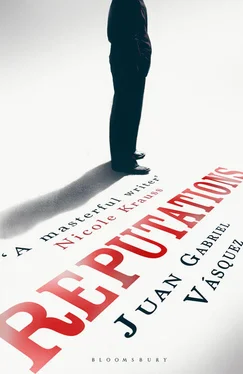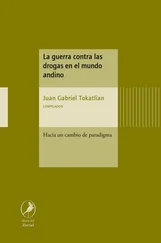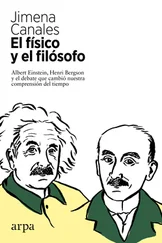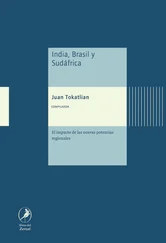‘Has she asked anything?’ said Mallarino.
‘Nothing,’ said Magdalena, ‘she hasn’t said anything.’
‘And what about the Leal girl? Do we know anything?’
‘No, nothing. We’ll see what happens when school starts again.’ Magdalena spoke in a soft voice, in those low but fine-tuned notes that only she was able to modulate, and Mallarino desired her again; he allowed himself to cast a direct glance at her breasts, remember them fleetingly, letting his eyes show that memory; Magdalena pretended not to notice, although women always noticed those things, and didn’t fold her arms and her face showed no sign she felt uncomfortable. She said goodbye affectionately, stroking Mallarino’s arm, and he was left alone with his daughter in his new house. This was an unprecedented kind of solitude for him at that moment: he was fascinated by the novelty of the feeling, undoubtedly related to the instinctive anxiety at having sole responsibility for Beatriz and her well-being, at least for the next forty-eight hours (a vertiginous figure). This emotion brought tears to his eyes: he felt ridiculous, mocked himself. In the mist of those new impressions he thought of Cuéllar and Cuéllar’s sons, who he’d never seen, and in his mind he imagined, vivid and mobile and bright like a film, a scene of a fist fight in a school playground, and he could almost see clothes tearing against pavement, bruises on faces, dark blood and tears, and he could almost hear the sound of the blows, bones colliding with bones. But the scene soon vanished, because Beatriz, with an irresistible smile of enthusiasm, had pulled out an old deck of cards with battered corners from her little pink knapsack, and was now asking her father to play manotón in spite of the fact that he’d explained to her countless times that playing the game with just two was no fun at all.
At the end of August, when classes resumed, Beatriz brought home the news (but it wasn’t so much news as a casual mention, an offhand comment) that Samanta Leal wasn’t there any more. She didn’t mention her again. So, with dismissive ease, the girl disappeared from Beatriz’s memory and perhaps that of the whole school, and Mallarino thought that he too, finding himself in the same situation, would have done the same: created a void of silence around the child, a closed and hermetic oblivion where what happened, not existing in the memories of those around her, would soon stop existing in her own memory. Change schools, change neighbourhoods, change cities, change something, keep changing, change to leave behind, change to erase: a true pentimento , the correction to a canvas after a change of heart, an image painted over another, a brushstroke of oil paint on top of other brushstrokes. That was perhaps what had happened in the case of Samanta Leal, because oil paint cannot be erased, but can be corrected; not eliminated, but buried under new layers. It was easy to correct a child’s life: just a couple of radical decisions and a real will, a real commitment to the correction, and that was all. Samanta Leal’s parents had decided to do that, and that was to be respected; Mallarino talked about it once with Magdalena, and Magdalena agreed. As the weeks went by, and the months, Samanta Leal also began to disappear from their memories, and what should have surprised them, but didn’t surprise them, was not remembering her even when they talked about what was happening to Adolfo Cuéllar.
First there were rumours. ‘The Witches’ Post’, the gossip section of a weekly magazine, ran a story about how Cuéllar and his wife had been at the centre of a small scandal in the queue for a cinema on Sixty-third Street. Later, El Tiempo published in its ‘women’s section’ — the word Women headed the page in hollow letters, barely an outline — a half-page interview in which the congressman’s wife spoke with pleasure about charity bazaars, literacy drives, donations to food banks and also to blood banks, and Mallarino was sure he was not the only one surprised or puzzled by the omission of any mention of Adolfo Cuéllar, whose influences, direct or indirect, had made the donations and drives and bazaars possible. ‘Señora Cuéllar’, read the text, ‘preferred discreetly that we not talk about her husband. “Dirty laundry gets washed at home,” she told us.’
And then, one November morning, Mallarino was woken by the telephone ringing. ‘They’ve asked for his resignation,’ said Rodrigo Valencia from the other end of the line. ‘Nobody’s talking about it as a punishment, because there’s nothing to punish. But my spies have very clear opinions. You don’t have to be too savvy to realize.’
It was still very early: Mallarino cradled the receiver between his shoulder and head while his hands, tingling with sleep, felt around for his cigarettes and lighter in the methodical messiness of his bedside table. ‘Realize what?’ said Mallarino.
‘Well, Javier, you know,’ said Valencia. ‘Or rather, the less said the better. Watch the news tonight, I’m sure there’ll be something.’
And there was: that night Mallarino turned on the television a couple of minutes before seven, and listened with half an ear to the end of an episode of the Mary Tyler Moore Show while filing away the press clippings he hadn’t used that week. He had time to go outside and find the dogs’ plastic dishes, serve them a scoop of dog food, come back up and wash his hands before the newscast began. The first commercial break suggested that on a salary of fifteen thousand pesos he could be a banker, asked him to drink a grape-flavoured soda pop (only because a roller-skating girl was carrying one) and ordered him urgently to buy the book The World Challenge . After all that, the presenter’s talking moustache announced the news.
The images, it seems, had been filmed that very morning. There was Cuéllar, his head on a bed of microphones like the head of John the Baptist on Salomé’s platter, announcing his temporary retirement from the Congress of the Republic on the very steps of the Capitolio Nacional. ‘No, gentlemen, it is not a matter of trying to hush anything up,’ he said: replying to a question that hadn’t been broadcast. That’s how the news item began, with that irritated stress the voice makes in denial. ‘No, not at all. The reasons are personal. I’m going to take a little break, this job wears a man down, you know what I mean? My family needs me, and the family is the top priority, isn’t it? At least I’ve always said so.’ Mallarino saw the image from the edge of his bed; he tried to capture, in his sketchbook with black covers, two or three details: the nose enlarged by the cameras, the gleam of the flashes reflecting off the slicked-over hair, the high collar of his checked shirt that added a fold and a shadow under the chin. Something caught the attention: some movement, a face he knew? Mallarino leaned forward; he saw a woman keeping a restrained silence behind the swarm of journalists; despite a background shot on television not being the same as a foregrounded newspaper portrait, he recognized Cuéllar’s wife, the laboriously curled black hair, the sky-blue eye shadow, a sepia-toned silk scarf wrapped around her long neck. He didn’t know what to make of that presence, for the woman’s face was half-hidden and her expression was inscrutable, and he went back to focusing on the congressman. It was true that he looked tired: the weariness, at least, was not feigned. He could see it in his eyes, thought Mallarino, those eyes that seemed irritated by the lights, and he could also hear it in his voice: it was no longer that indiscreet and repugnant voice that had asked him for clemency that afternoon and later forgiveness, but it still had something in common with it. What was it?The image of Cuéllar — his practised indifference or confidence on the stone steps of the Capitolio — lasted a very short time, a few brief seconds, and was cut when, after the last of his indifferent and confident answers, the reporters rose up in an incomprehensible salvo of questions. The newscast went on to announce the dismantling of a conspiracy to overthrow the government in Spain, but Mallarino went on thinking about the head that was speaking among microphones and comparing it to the head that had spoken to him, drooping and humble, the afternoon of the party, and suddenly he was also thinking about the head of the woman who was observing the whole scene from behind, and then went back to thinking about the man at the party and the man on television. And then he knew, both were humiliated men. It was true that now, on television, the humiliation had been more obvious and notorious, but was actually nothing more than the exacerbated or extreme version of the previous humiliation, or rather the previous one had been the seed, and the current one, broadcast on national television at peak viewing hour, its full flowering. And now he focused on the wife again: the humiliation, all humiliation, needs a witness. It doesn’t exist without it: nobody is humiliated alone: humiliation in solitude is not humiliation. Was Cuéllar’s wife the witness at this moment? Or were the journalists? Were the real reasons he was leaving his post known or not? Did they or did they not have Mallarino’s drawing in mind? Did he, Adolfo Cuéllar? What bothered people who were caricatured most, as Mallarino had discovered over the years, was not seeing themselves with their defects, but everyone else seeing them: like when a secret comes to light, as if their bones were a well-guarded secret and Mallarino had revealed them all of a sudden. Did that happen to Cuéllar? His wife was looking at him, the journalists were looking at him, Mallarino was looking at him, millions of people all over the country were looking at him. . Cuéllar had become a visible being, too visible; Mallarino imagined himself observing the city from on high and at the same time he imagined the satisfaction the little people must feel, the men and women who were too small and insignificant to be seen by him and those like him. Perhaps Cuéllar, in these moments, would have preferred to be one of those men nobody sees, an anonymous and hidden creature. Or perhaps he was justly turning into one of them: by giving up his privileged position, going into the shadows to blend in with those who were not privileged, he was also fleeing from future humiliations. Without privileges, Adolfo Cuéllar would be safe from those, like Mallarino, who see the world through the humiliations of others; those who seek out weaknesses in others — bones, cartilages — and pounce to exploit them, the way dogs smell fear. Mallarino turned off the television. As the back of his hand passed in front of the screen, he felt the tickle of static electricity on the hairs of his fingers and on his skin.
Читать дальше












